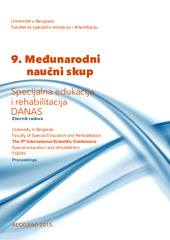Приказ основних података о документу
Dnevni boravak – mogućnosti i izazovi
Day care – opportunities and challenges
| dc.contributor | Vuković, Mile | |
| dc.creator | Maljković, Marija | |
| dc.creator | Ilić, Zoran | |
| dc.date.accessioned | 2022-03-08T14:12:32Z | |
| dc.date.available | 2022-03-08T14:12:32Z | |
| dc.date.issued | 2015 | |
| dc.identifier.isbn | 978-86-6203-069-6 | |
| dc.identifier.uri | http://rfasper.fasper.bg.ac.rs/handle/123456789/4210 | |
| dc.description.abstract | Zaštita mladih sa poremećajima ponašanja, a posebno dece i maloletnika u sukobu sa zakonom dobija novu dimenziju uspostavljanjem posebnog pravosuđa za maloletnike. Naime, pored pitanja koja vrsta tretmana i u kojim uslovima obećava da će u najkraćem vremenskom roku zadovoljiti razvojne potrebe deteta, kao i potrebe njegove porodice, nameće se i zahtev za poštovanjem osnovnih principa i prava deteta, kao i da potrebna usluga bude obezbeđena u njegovoj sredini i da bude usklađena sa prirodnim životnim tokom deteta, obezbeđujući kontinuitet njegovog razvoja. Zakon o maloletnim učiniocima krivičnih dela i krivičnopravnoj zaštiti maloletnih lica (2006.) predvideo je uvođenje novih usluga i tretmana u zajednici, a posebno je značajno koncipiranje usluge dnevnog boravka za decu i mlade sa poremećajima u ponašanju, koja je regulisana kao pravo. Dnevni boravak je forma tretmana koja se može odrediti kao sredina kontinuuma „institucionalni-vaninstitucionalni” tretman. Predstavlja skup programa različitog stepena specijalizacije i intenziteta, koji su više strukturirani nego tipičan vaninstitucionalni tretman, a koji su istovremeno manje restriktivni nego tipične forme zavodskog – institucionalnog tretmana. Programi i tretmani koji se razvijaju u dnevnom boravku imaju različite ciljeve koji se u savremenoj praksi kreću od podsticanja razvoja, kompenzacije propuštenog u razvoju deteta i korektivno-terapijskih pristupa. Teorijsko-metodološki pristupi u okviru ovog koncepta kreću se od humanistički orjentisanih do bihejvioralnih, naročito kognitivno-bihejvioralnih i sistemskih i porodičnih pristupa. Osnovni cilj ovog rada je analiza i unapređenje rada dnevnih boravaka u Srbiji, kao i pokušaj podsticanja interesovаnjа nаučne i stručne jаvnosti zа аdekvаtno pozicionirаnje tretmаnа ove populаcije u sisitemu društvenog reаgovаnjа nа rаzvojne probleme dece i mlаdih. | sr |
| dc.description.abstract | Protecting of young people with behavioral disorders, especially of children and minors in conflict with the law gets a new level by establishing a separate minor’s justice system. Namely, besides the questions what kind of treatment in which conditions promises meets in the shortest possible time the developmental needs of the child, as well as the needs of his family, there is a requirement to respect the fundamental principles and rights of the child, as well as necessary services to be provided at the center and be integrated with the natural life of the child, ensuring the continuity of its development. The Law on Juvenile Offenders and Criminal Protection of Minors (2006) predicted the introduction of new services and treatment in the community, and it is particularly important concept day care services for children and youth with behavioral disorders, which is regulated as a right. The daily stay is a form of treatment that can be defined as middle continuum “institutional-non-institutional” treatment. It is a set of programs with different degrees of specialization and intensity, which are more structured than typical non-institutional treatment, all of which are less restrictive than the typical form of prison – institutional treatment. Programs and treatments that are being developed in the daily stay have different objectives in contemporary practice range from encouraging development, compensation missed in child development and corrective and therapeutic approaches. Theoretical and methodological approaches in the context of this concept range of humanistic oriented to behavioral, cognitive-behavioral especially the systemic and family approach. The main goal of this work is to analyze the improvement of day care centers in Serbia, as well as an attempt to encourage interest in scientific circles for the proper positioning of the treatment of this population in the system of social reaction to the problems of development of children and youth. | sr |
| dc.language.iso | sr | sr |
| dc.rights | openAccess | sr |
| dc.rights.uri | https://creativecommons.org/licenses/by-sa/4.0/ | |
| dc.source | Zbornik radova - 9. Međunarodni naučni skup „Specijalna edukacija i rehabilitacija danas“, Beograd, Srbija, 25–27.9.2015 | sr |
| dc.subject | tretman | sr |
| dc.subject | poremećaji ponašanja | sr |
| dc.subject | kombinovane smetnje | sr |
| dc.subject | dnevni boravak | sr |
| dc.subject | mladi | sr |
| dc.subject | treatment | sr |
| dc.subject | behavioral disorders | sr |
| dc.subject | combined problems | sr |
| dc.subject | day care | sr |
| dc.subject | young | sr |
| dc.title | Dnevni boravak – mogućnosti i izazovi | sr |
| dc.title | Day care – opportunities and challenges | sr |
| dc.type | conferenceObject | sr |
| dc.rights.license | BY-SA | sr |
| dc.citation.epage | 155 | |
| dc.citation.spage | 151 | |
| dc.identifier.fulltext | http://rfasper.fasper.bg.ac.rs/bitstream/id/6453/Untitled18.pdf | |
| dc.identifier.rcub | https://hdl.handle.net/21.15107/rcub_rfasper_4210 | |
| dc.type.version | publishedVersion | sr |


